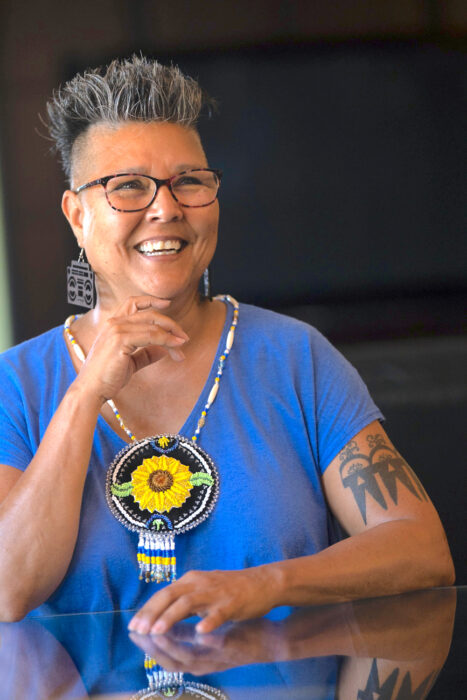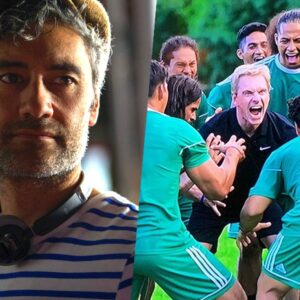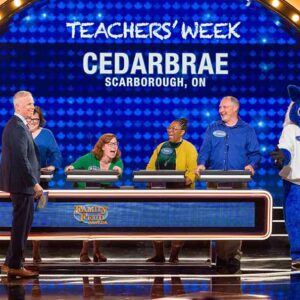
January Rogers has been selected to be one of several mentors in the 2022 Audible Indigenous Writers’ Circle.
The Audible Indigenous Writers’ Circle is a six-month mentorship and workshop program for emerging First Nations, Inuit and Métis writers in Canada looking to elevate their stories. The 2022 program launched this summer and our writer Jace caught up with Rogers last week to chat about her work, storytelling, and what motivated her to want to mentor new and emerging writers.
Rogers is a multi-award-winning Mohawk/Tuscarora poet, media producer, performance and sound artist. She lives on her home territory of Six Nations of the Grand River where she operates Ojistoh Publishing and Productions. She has seven published poetry titles and is currently developing a comedy web series titled NDNs on the Airwaves.
Rogers is mentoring Emma Hassencahl-Perley, Bren McKay, and Raymond Sewell.
TRT: What excites you about helping someone learn more about who they are as a writer?
JR: I get excited about helping others on their path to becoming a writer because the writers who are a part of this circle are career-writers. This isn’t just for hobbyists or someone who writes poetry on a Sunday. I get excited because that’s the point in my career where I am at.
Making a living through your creativity is so fulfilling. Nothing really like it. I get excited because I know others are looking to embark on entering into the circle of making a living off their own intellect.
TRT: What are you favourite types of storytelling; poetry, short story, fiction?
JR: It’s all storytelling to me and I think that’s what I like the most about it. We find storytelling in comedy, media arts, podcasts. I like the versatility of storytelling itself. We’re coming to the understanding that storytelling starts everything else off in playwriting. In scriptwriting. There’s great storytelling in poetry. Prose. I like the fact that storytelling has become a huge umbrella where all of these other genres can live, thrive, and find a place.
TRT: How did you know you were going to be a producer/storyteller?
JR: I just started doing it. I thought, ‘I’m going to take the skills I have as a writer and manage my own career.’ I was able to do that very early on. I have a good balance of being able to co-ordinate and keep things organize, while also being creative. It takes two very different skillsets to produce and create.
TRT: In what ways does Six Nations and the places you call home influence the way you tell stories?
JR: Knowing that I have a whole community of people to answer to with my storytelling has almost been more exaggerated since I moved back home. Being home has accelerated and expanded the ways in which I create literary work. But it also makes me promote the responsibility even more in my writing.
TRT: What do you expect from the people you mentor?
JR: I hope that I don’t see anything cliche. If I see cliche writing I’m going to call them on it. I hope to see very honest and authentic writing. Hope to see personal writing. Doesn’t have to tell me all about them and their lives but work that comes from a place of lived experience from them. That translates really well. Don’t tell me someone else’s story, tell me your story in only the way you can tell them.
TRT: What are some ways you critique your own work, that you also critique your mentees in?
JR: I promote lean writing. Being a poet, lean writing is taking out extraneous words, ideas, repetition, phrases, stay with it, keep writing and moving toward what you need to say. Putting your opinions on a page is risky. And risk is fun.
TRT: What are some areas in your own storytelling you could grow in?
JR: Well, I’m kind of expanding right now. I’ve written a play and I haven’t written a play in many years. I built my career on being a poet and spoken word poet and lately media or performance poetry. But now I’m working in playwriting and I’m thrilled to realize I still have the skill.
TRT: What are some ways you’re a great mentor?
JR: Because after a session with the mentees I feel invigorated. It’s like teaching a class. You should walk away from teaching a class feeling energized and inspired and that’s how I feel after a session.
TRT: What are some ways you’re a hard mentor?
JR: My need for them to be a bit more organized. I’m super organized so if I send off an email to them, I really expect a response within a day or two. And if I don’t get it, I’ll hound them.
TRT: What are some ways you encourage students to dig deep, speak authentically and head toward sensitive or personal topics?
JR: I think in part it’s about giving permission for them to do that. Enthusiasm goes a long way. It’s infectious. When I see someone writing from a real and personal space, I give stars on my edits. I tell them I love this. Or that it resonates. Art is about energy and its impact. I let them know that the honest stuff translates.











